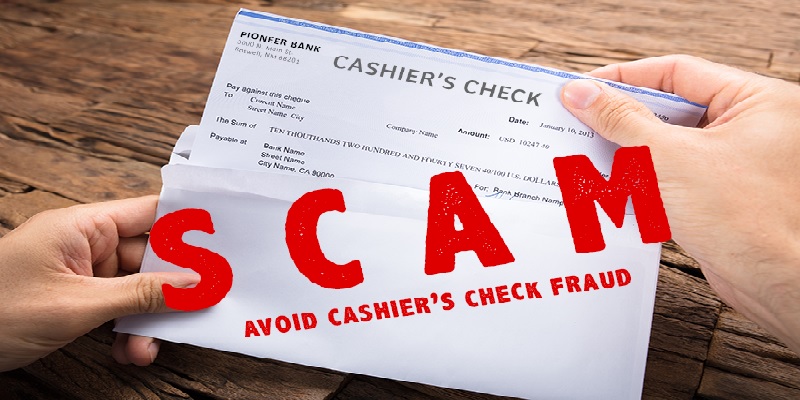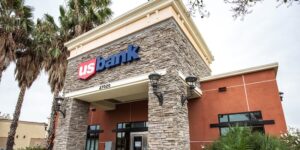 Compared to a personal check, a cashier’s check is issued by your bank. Normally, a cashier’s check is seen as much safer than a personal check since there are lower scam risks. However, cashier’s checks still come with many risks as well, Be sure to read more below for more information on how to stay clear of scams and fraud possibilities.
Compared to a personal check, a cashier’s check is issued by your bank. Normally, a cashier’s check is seen as much safer than a personal check since there are lower scam risks. However, cashier’s checks still come with many risks as well, Be sure to read more below for more information on how to stay clear of scams and fraud possibilities.
 |
 |
Types of Scams
There are many scams that comes with a regular cashiers check. It can lead to you depositing a fake check and wiring money to your scammer rather than its intended receiver. Here are some potential scams to be aware of:
- Mystery Shopper Scams. These types of scammers will get money by making transactions and reports for their experiences. Actual companies will have mystery shoppers assist them in looking for chances of bettering this method. Scammers can get mystery shopper for lousy bank and wire transfers. The shopper will receive a check to deposit and will be asked to wire the money towards a third party.
- Craigslist Scams. A Craigslist scam will try to offer you a cashier’s check that’s worth more than what the price is listed for. Additionally, to try to win you over, the seller will offer to refund extra money over a wire transfer as well. Basically, they want you to make a deposit with a cashier’s check.
- Work-From-Home Scams. There are some scammers that will offer at home jobs that will pay you for processing transactions with your personal bank account. Plus, they can even guarantee you will get paid before you’ve actually done anything for them.
- Property Rental Scams. Potential scams will go for renters and landlords, so no one is completely safe. They will try to advertise and take deposits towards rental properties they don’t really own or take care of. These scammers will act like a renter and pay for initial rent, and other charges. However, they won’t close the deal in the end.
- Foreign Lottery Scams. With these scams, they can look very different from one another. The scammer will state that they won, got money, or saved a good amount in their financial institute. Then, they will ask you to deposit a cashier’s check in your account and send some of it to them. You will lose all they money you wire to them if this happens.
Safe Cashier’s Checks & Fake Checks
Actual cashier’s checks are almost completely risk free and is one of the main methods of payment for huge transfers. Additionally, they are very beneficial for transactions with people you’ve never interacted with financially before.
However, keep an eye out for fake cashier’s checks. Normally, they look almost identical to a real check, but have some features that are different from the real deal. Some pointers for spotting a fake check are:
- Check the name of the bank.
- Call the official bank number to verify the check
- Look for a perforated edge that shows it was printed on a business printer.
- Check for note stains, gaps, and pen marks that show it was forged.
- See if the logo is low-quality
- Check for mismatched check numbers at the top and bottom right corners.
- Look at the ink (fake checks will have shiny ink)
- See if the routing number is nine-digits long.
Protect Yourself From Scams
You can protect yourself from potential cashier’s check scams by:
- Staying away from home jobs and suspicious mystery shopping jobs that want you to deposit or transfer funds.
- Do your research on the companies that want to hire you before you take the job. Don’t take a job that needs you to make a payment upfront.
- Do not agree to make wire transfers or send money to people you do not know.
- If someone uses a cashier’s check to make a transaction. Try to state that the check has to be written for a specific transaction price.
- You can take cashier’s checks from banks and other financial institutes that you can get in touch with to confirm it.
However, if you happen to deposit a fake cashier’s check, you’ll lose lots of money and risk criminal charges. Plus, you have to pay back what was taken and extra charges to cover overdraft fees. You can contact your bank when you think that there’s a scam happening. Then, call the police to report and document that you’re the victim. File complaints with: the FTC, the U.S. Postal Inspection Service, and your state attorney general.
Conclusion
Overall, cashier’s checks are relatively safe to use if you get it directly from your bank yourself. Plus, if you deposit a fake check, there are many downsides for you that you’ll have to pay for. Be sure that you know the types of potential scams for these checks, so you don’t have to pay the charges that come with it.


